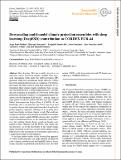Por favor, use este identificador para citar o enlazar a este item:
http://hdl.handle.net/10261/304484COMPARTIR / EXPORTAR:
 SHARE SHARE
 CORE
BASE CORE
BASE
|
|
| Visualizar otros formatos: MARC | Dublin Core | RDF | ORE | MODS | METS | DIDL | DATACITE | |

| Título: | Downscaling multi-model climate projection ensembles with deep learning (DeepESD): Contribution to CORDEX EUR-44 |
Autor: | Baño-Medina, Jorge CSIC ORCID; Manzanas, Rodrigo CSIC ORCID; Cimadevilla, Ezequiel CSIC ORCID; Fernández, Jesús CSIC ORCID; González-Abad, Jose CSIC ORCID; Cofiño, Antonio S. CSIC ORCID; Gutiérrez, José M. CSIC ORCID | Fecha de publicación: | 6-sep-2022 | Editor: | Copernicus Publications | Citación: | Geoscientific Model Development 15817): 6747-6758 (2022) | Resumen: | Deep learning (DL) has recently emerged as an innovative tool to downscale climate variables from large-scale atmospheric fields under the perfect-prognosis (PP) approach. Different convolutional neural networks (CNNs) have been applied under present-day conditions with promising results, but little is known about their suitability for extrapolating future climate change conditions. Here, we analyze this problem from a multi-model perspective, developing and evaluating an ensemble of CNN-based downscaled projections (hereafter DeepESD) for temperature and precipitation over the European EUR-44i (0.5°) domain, based on eight global circulation models (GCMs) from the Coupled Model Intercomparison Project Phase 5 (CMIP5). To our knowledge, this is the first time that CNNs have been used to produce downscaled multi-model ensembles based on the perfect-prognosis approach, allowing us to quantify inter-model uncertainty in climate change signals. The results are compared with those corresponding to an EUR-44 ensemble of regional climate models (RCMs) showing that DeepESD reduces distributional biases in the historical period. Moreover, the resulting climate change signals are broadly comparable to those obtained with the RCMs, with similar spatial structures. As for the uncertainty of the climate change signal (measured on the basis of inter-model spread), DeepESD preserves the uncertainty for temperature and results in a reduced uncertainty for precipitation. To facilitate further studies of this downscaling approach, we follow FAIR principles and make publicly available the code (a Jupyter notebook) and the DeepESD dataset. In particular, DeepESD is published at the Earth System Grid Federation (ESGF), as the first continental-wide PP dataset contributing to CORDEX (EUR-44). | Versión del editor: | https://doi.org/10.5194/gmd-15-6747-2022 | URI: | http://hdl.handle.net/10261/304484 | DOI: | 10.5194/gmd-15-6747-2022 | E-ISSN: | 1991-959X |
| Aparece en las colecciones: | (IFCA) Artículos |
Ficheros en este ítem:
| Fichero | Descripción | Tamaño | Formato | |
|---|---|---|---|---|
| gmd-15-6747-2022.pdf | 7,73 MB | Adobe PDF |  Visualizar/Abrir |
CORE Recommender
SCOPUSTM
Citations
14
checked on 17-abr-2024
WEB OF SCIENCETM
Citations
10
checked on 28-feb-2024
Page view(s)
39
checked on 26-abr-2024
Download(s)
39
checked on 26-abr-2024
Google ScholarTM
Check
Altmetric
Altmetric
Este item está licenciado bajo una Licencia Creative Commons

